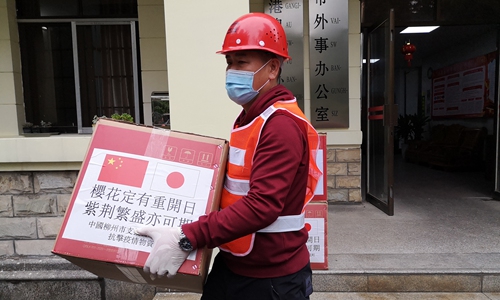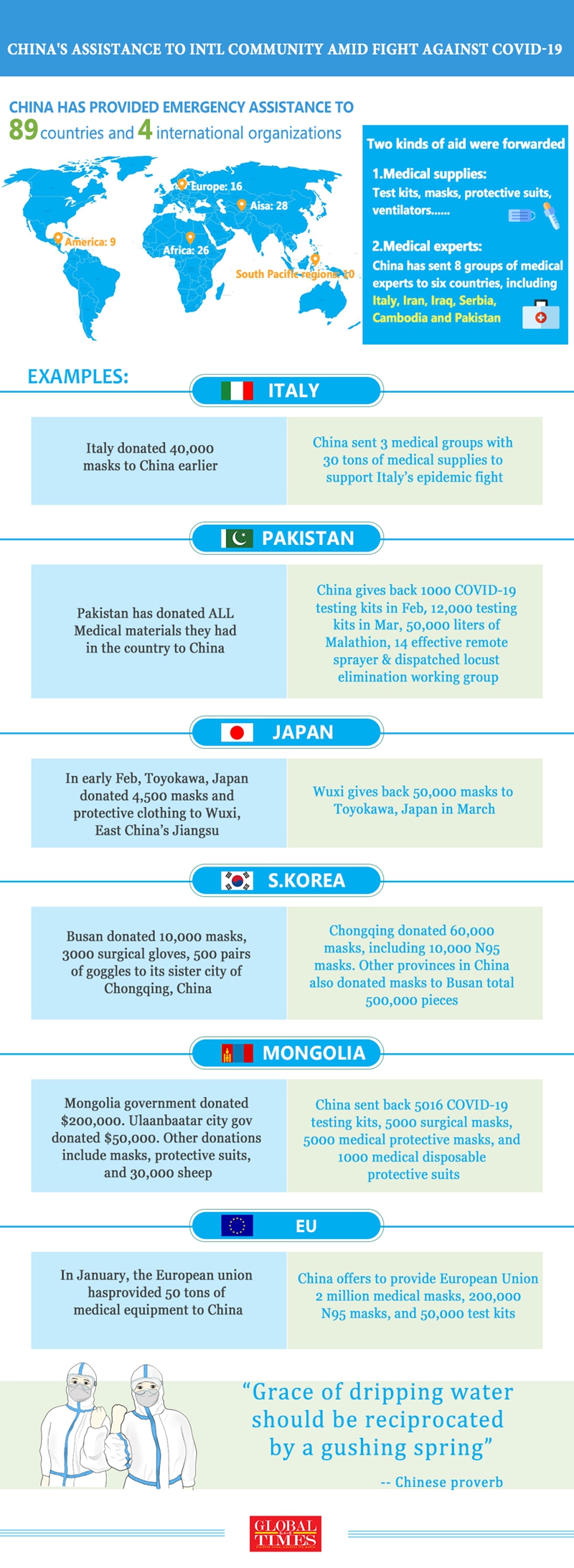HOME >> CHINA
As domestic outbreak wanes, China rushes to assist other countries
By GT staff reporters Source:Global Times Published: 2020/3/29 20:43:40

Liuzhou, South China's Guangxi Zhuang Autonomous Region, donates 40,000 face masks to Amimachi, Japan's Ibaraki Prefecture on March 26. Photo: cnsphoto
Amid the global spread of COVID-19, China has donated masks and medical supplies to countries in urgent need. These efforts have been lauded by Chinese netizens who said China is returning the favor to those who offered it support during its hardship.
The hashtag "Paying back the kindness times 10" became a trending topic on Sina Weibo, concerning Wuxi, East China's Jiangsu Province, and Toyakawa, Aichi Prefecture, Japan.
According to Japanese media, Toyakawa sent 4,500 masks and protective suits to Xinwu district of Wuxi on February 4 to help contain COVID-19. However, by March 22, there were confirmed cases in Toyakawa and the city faced a shortage of masks. The mayor of Toyakawa asked whether or not Wuxi had any masks left and if they could be returned.
The Chinese Embassy to Japan tweeted on March 24 that Xinwu district of Wuxi purchased 50,000 masks to send to Toyakawa. "We hope to pay back [Toyakawa] 10 times the kindness we had received when we were plagued by the virus," the embassy tweeted.
After the exchange, the hashtag "Paying back the kindness times 10," was used by many Chinese netizens to comment on Xinwu district's actions, which echo the adage that "courtesy calls for reciprocity."
Some netizens also commented "You dida dida me, I hualahuala you." "Dida" and "huala" are mimetic words for dripping water and gushing river respectively. The comment is translated from an old Chinese saying, which means "The grace of dripping water should be reciprocated by a gushing spring."
Back in February, when China faced a severe stage of the epidemic, many countries offered help by sending urgent medical supplies.

Global Times
Hua Chunying, a spokesperson of the Foreign Ministry said during a press conference on February 5 that 21 countries and The United Nations Children's Fund donated money and materials to China, and individuals in many countries expressed their encouragement to support Wuhan, the city worst hit by the virus.
Deng Boqing, a senior official from China International Development Cooperation Agency, told a press conference on March 26 that China takes several factors into consideration when deciding to send help, including the severity of the pandemic in one country, the given country's medical resources, whether the country had requested help from China, and the Chinese government's capability.
To ensure a country's domestic needs are met and operate under the principle of doing the best within our means, China would negotiate an aid plan with a particular country, said Deng.
Deng also said Chinese traditional culture provides that kindness should be paid back. For countries that had helped China, "we will remember the kindness forever and pay back in time." For China's assistance to other countries, it is not only about paying back the kindness but also about how "a friend in need is a friend indeed."
Zhang Yiwu, a Peking University professor, told the Global Times that what China has done showed its responsibility as a big country.
"Moreover, no country can be immune to the influence of the virus in the context of globalization. China's assistance to other countries could also help shorten the pandemic time of the world as the situation in one country cannot get better unless the global pandemic has been under control," Zhang said.
In response to some Western media's criticism that China is offering assistance to "fix" its image, Zhang said that a virus has no nationality and it poses similar challenges to every country. "China has made great sacrifice to contain the spread of the virus and earned time for the whole world, which should not be under unfair criticism."
"The low effectiveness of some Western governments in dealing with the virus may shock some people and it is embarrassing for them to admit it. However, we are in a critical period in which we need all countries to cast away bias and work together to help each other to save lives," Zhang said.
Newspaper headline: Drips of grace
RELATED ARTICLES:
Posted in: IN-DEPTH